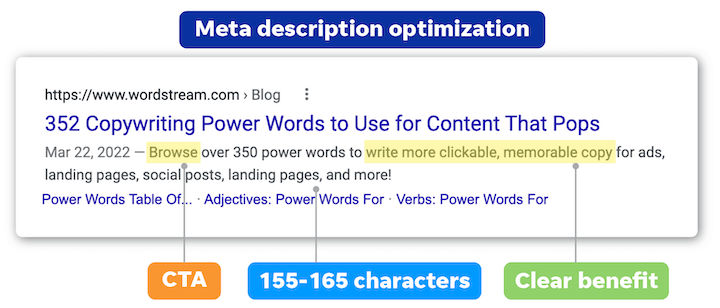2025 has been a crazy year in search engine optimization. Google’s aggressive roll out of AI Overviews and introduction of AI Mode has many sites experiencing a rise in impressions and drop in clicks–or actual traffic to their sites.
Some SEO niches, tactics, and sites remain largely unimpacted by all of the changes.
Hearing SEOs in articles and podcasts talking like traditional ranking factors and organic traffic from non-AI features are completely dead.
Yikes, far from the truth.
— Andrew Charlton (@bertiecharlton) July 2, 2025
Google has never officially disclosed its ranking factors, but has indicated that there are at least 200 and that they change over time (both in terms of the list and the relative importance of the factors).
In this article, we’ll focus on the most important factors you need to know about (and optimize for) in 2025.
Contents
7 SEO ranking factors you need to optimize for in 2025
Let’s get into the most important ranking factors to keep an eye on if you want your SEO strategy to excel this year.
1. Authority and links
Domain authority, external links to specific pages, and internal links still matter a lot in Google searches.

Semrush found in a recent study that AI Overviews showed significant overlap—around 86% domain and 67% URL—with traditional Google search results.
So whether your search results are being impacted by AI Overviews or not, authority and links to your site (which have a massive impact on traditional organic rankings) are still important.
Link building can be done via a number of different methods. Some that “still work” to help impact this basket of ranking factors include:
- Links from profiles and local citations pointing to your domain and helping Google understand more about your business.
- Digital PR links and general public relations links.
- Guest posting.
- Traditional link outreach.
Within even those broad tactics, there are many more specific approaches (studies, data-focused articles, city-specific or localized content, etc.), but regardless of your approach, the volume and quality of links to your domain and to your site’s individual pages is a very important basket of ranking factors to keep in mind in 2025.
🔎 Need help understanding the modern rules for SEO? Download our free guide >> How to Do SEO Right—Right Now!
2. Engagement metrics
Google has long said that factors like how quickly pages load and their mobile-friendliness are ranking factors. In recent years, through leaked documents and testimony, Google has admitted that metrics like click-through rate and how a searcher interacts with a search results page are ranking factors for Google.
This means that it’s still important to optimize for:
- Pages that load quickly and are mobile-friendly.
- Title tags and headlines that generate high click-through rates and deliver on the promises of your meta titles and descriptions.

3. Page speed and page experience
You can use free tools like Google’s PageSpeed tool or the GT Metrix testing tool to get quick suggestions about tasks to clean up to help your pages load more quickly:

If you’re a small business owner, these insights may not mean much to you, but a web developer should be able to review these and address the highest impact, simplest items. Most often, we see sites with issues like:
- Legacy JavaScript: This may be from a tool you no longer use, or some code that a developer added to your site previously that the site no longer needs—this is a great opportunity because it “costs” you nothing in terms of the site’s performance and helps speed things up.
- Render blocking: Often, your site may have a specific tool (like tracking tools or some specific code) that isn’t needed for the visitor to see your site immediately, but that you want to load eventually. You can load those elements later in the process and create a much better experience for visitors.
These opportunities vary from site to site, but for most small businesses, there will be some opportunities like this.
Improving load times is especially valuable because it can also help your site’s conversion rates.
4. Click-through rate improvements
Having pages—particularly your most popular pages—that are frequently clicked on when visitors see them in search results will have a major impact on your rankings.
The percentage of times searchers click on your website listings is your click-through rate, and you want to optimize this for key pages and for all of your pages. Your main opportunities here are a page’s meta title tag, and its meta description:

How do you know what to include in the page title and meta description? Think of it like you would ad text in a pay-per-click ad:
- Understand basic marketing: Does your title and description satisfy the search queries that drive the most traffic to the relevant page? What is the searcher really looking for? Try to find a way to:
- Promise that thing.
- Do it in a way that’s differentiated from other sites.
- Make sure you deliver on that on the page.
- Look at the SERP: A good place to look for ideas is in the search result itself. What is the title tag of sites ranking higher than yours? There may be multiple reasons those sites rank, so don’t just copy their titles and descriptions blindly, but it may give you some food for thought.
- Use AI tools: Title tags and meta descriptions are an area where tools like ChatGPT or Perplexity are very good at ideation and giving you possible formats you can use. Give the tool as much information as you can (your title tag, the title tags of other pages that rank, the search terms your page shows up for, etc.).
- Include your own data: Look in Google Search Console at your own pages. If there are specific pages that get a particularly high click-through rate (outside of your homepage, which likely does well because of branded traffic to your site), the title tag you use there may be a strong one to consider for other, similar pages.
Along those lines, if you have a site that’s getting a few hundred or even a few thousand visitors a month, you don’t need to spend a lot of time optimizing title tags and meta descriptions throughout your site. Focus on the few pages getting the most traffic from search, and the formula for collections of pages.
For instance, if you have a music lessons site with a series of local pages targeting terms like piano lessons in Kalamazoo, piano lessons in Portage, etc., look at the click-through rates for those pages, look at the ideas you have for the most highly trafficked pages there, and make changes across those pages and measure accordingly. You can do this periodically as well—probably every six months or so.
The more traffic your site and individual pages have, the more it makes sense to spend more time optimizing CTR and titles and descriptions.
📚 Free guide download >> 135 of the Best Words & Phrases for Marketing with Emotion
5. Branded search
Google has patents for using branded search traffic as a proxy for how trusted a site should be. This can be a difficult thing to “optimize” for, but some ways to think about this include:
- PR. Traditional PR and getting featured in the publications your prospects read most often is a great way to get people to search for your brand.
- Signage, trucks, etc. Having signage for your business, wrapping trucks if you have a business where those are in the wild, etc., is another way to drive branded search.
- Partnerships. Partnering with relevant businesses (in the case of a local business, this could be other businesses in your area, particularly those that your best prospects would be likely to use—e.g., if you offer music lessons, a local musical instrument store, or even different companies offering kids’ activities).

There are similar advantages to increasing branded search to improving page speed, in that you’re getting more brand awareness generally and helping your business, not just your search rankings.
One note here: While Google has explicitly said that branded mentions that aren’t links are not a ranking factor, there is evidence that these help power your visibility in AI tools like ChatGPT, Claude, etc., and that citations help with local rankings if you have a business focused on local SEO.
6. Content relevance
The idea that you would need to have a page be relevant to a search query is obvious, but becoming a “topical authority” and creating “topic clusters” for SEO is an additional factor that Google and Google patents have referenced many times.

Here are some of the things Google has said about topic clusters and building authority:
- Google prioritizes topic clusters: Google’s patents explicitly use the notion of “topical clusters” when weighting links. For example, a Google patent on ranking documents notes that “when a topical cluster associated with the source document is related to a topical cluster associated with the target document, the link has a higher probability of being selected.” In other words, links between pages on the same topic (same topical cluster) are considered more likely (and thus more valuable) than links between unrelated pages.
- Internal links are important: In another Google patent on onsite ranking, Google describes how links from pages within the same site signal importance. It explains that if “numerous other web pages associated with the same domain contain links to that particular web page, the web page may be of greater importance within the domain compared to other web pages.” This underscores that pages heavily linked by other pages on the same site (often topically related pages) are treated as more central within that site.
- It helps to merge related pages: Google’s John Mueller has spoken about combining related pages to improve relevance. He explained that if you merge several weaker pages on a common topic into one, the resulting page becomes “a stronger page” because “more parts of the site are referring to this one single piece of content, so it’s probably more relevant than those individual small pieces you had before.” This reflects that internally linking and consolidating semantically related content boosts that content’s perceived relevance.
- A topic focus is essential: Mueller also cautioned against combining unrelated content. He noted that merging “two completely separate pages” on different topics forces Google to ask “What’s the primary topic of this page?” This implies Google expects a clear, focused topic per page (and by extension per site section), suggesting a site should group similar topics rather than mix them.
🚘 Looking for more ways to drive people to your site? Free guide >> 25 Ways to Increase Traffic to Your Website
7. Content accessibility
Making pages and content accessible to search engines is the most fundamental way you can give your content a chance to rank.
If your site currently isn’t getting traffic, you can run diagnostics and make sure that you don’t have issues with things like noindex tags, robots.txt directives, or other technical issues keeping your content from being crawled, indexed, and then returned in search results.
Google Search Console has helpful tools to identify whether pages have been discovered, crawled, or indexed:

Bonus: Search “everywhere” optimization ranking factors
While there’s a lot of back and forth about what to call getting visibility in tools like ChatGPT, Claude, Perplexity, etc., some have argued that this kind of visibility is still SEO.
AI Overviews and placement in LLMs have their own set of ranking factors, and a lot of overlap with traditional SEO ranking factors (which still drive the majority of referred traffic from search for most sites).
Beyond these factors, specific things like using schema formatting, showing up prominently in listicles with brand mentions, and other factors can help your site show up in AI search results as well as traditional SERPs.










